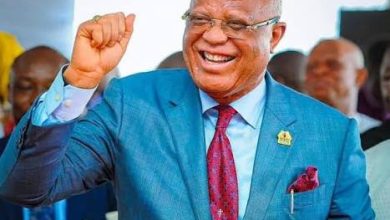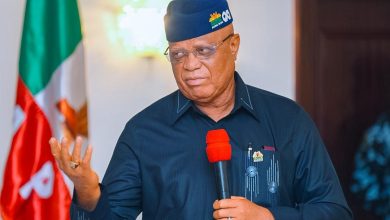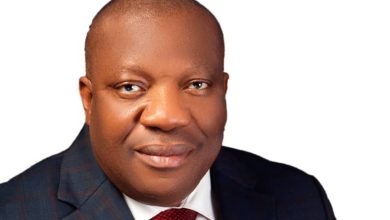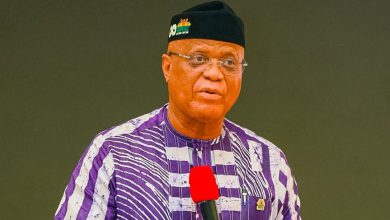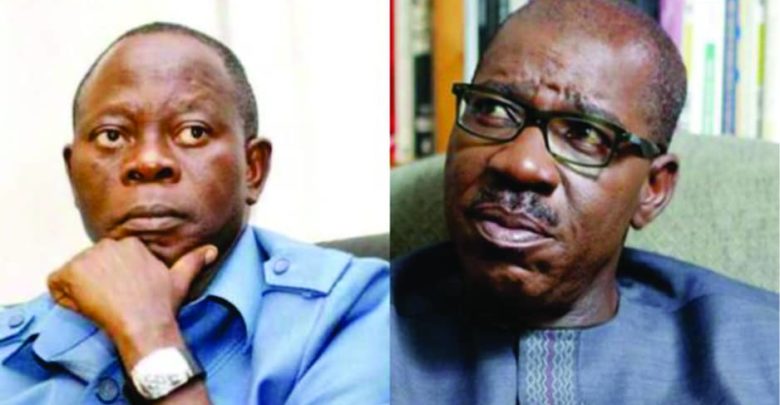
Kwankwaso versus Ganduje
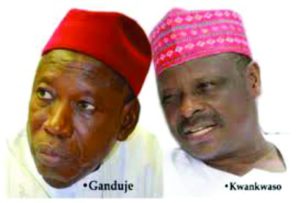
Rabiu Kwankwaso piloted the ship as Kano State Governor along with his then deputy, Abdullahi Ganduje between 1999 and 2003. Both of them were re-elected in 2011.
They were close allies hence enjoyed a smooth working relationship for the eight years that they worked together.
And so when Kwankwaso rounded off his tenure as governor, he anointed his deputy and friend, Ganduje as his successor. All seemed well until signs emerged that raised doubts about their once flourishing relationship.
As many governors do, Kwankwaso had parting gifts for those who worked with him. His personal aides and others received the governor’s gifts with grateful hearts except Ganduje who rejected a gift from his godfather.
One thing led to another and cracks in their relationship took a turn for the worse when members of Kwankwaso’s Kwankwasiyya issued a 48-hour ultimatum to remove his red cap which they said was the trademark of his boss, Rabiu Kwankwaso.
Chairman of Hannun Karba, Alhaji Shari Garba Gwammaja who spoke at the 60th birthday of its founder and 6th anniversary of the movement, asserted that Ganduje had betrayed the group.
According to him: “we appeal to the people of Kano to forgive us for presenting Ganduje to them as governor. We are regretting our action and God willing, we will rectify it in the next general election. We hope our apology would be accepted.”
But Ganduje was not in any mood to keep mute hence in a quick retort, he dismissed the threat of a legal action against him by the movement if he failed to stop wearing the red cap within 48 hours as “the most laughable, pathetic, and clear indication of their ignorance of the law and history of political struggle in Kano.”
Ganduje’s Information Commissioner, Alhaji Muhammad Garba, was unsparing as he warned Kwankwaso to trade softly or force the administration to constitute a panel of inquiry to probe him. Said he: “This deliberate distortion of facts and spreading of falsehood is capable of provoking the government to drop its non-confrontational stance and institute a commission of inquiry to probe the previous administration, particularly on illegal land deals, education and infrastructure.”
In a bid to whittle down the influence of Kwankwaso and whatever structure he left behind as governor, Ganduje’s men dismantled Kwankwasiyya Amana, a structure owned by Kwankwaso. In a swift move, they replaced it with another structure codenamed Gandujiyya Akida.
This was done to enable Ganduje assume full control not only as governor but also as the leader of the APC in Kano, given what they described as Kwankwaso’s overbearing influence in the affairs of the state.
Speaking on why he parted ways with his godfather, Ganduje said: “When I was nominated and after I won the elections in 2015, before handing over, I started seeing some elements of undercuts from his body language. “He didn’t attend my swearing-in; he just handed over and left for Abuja because he claimed he had something to do. I said okay and went for the swearing-in.”
With his relationship with his predecessor and friend having hit the rocks and his place and influence in the APC reduced, Kwankwaso joined the Peoples Democratic Party in 2018 to pursue his Presidential aspiration. He however lost the party’s nomination ticket to Atiku Abubakar. Since then, Kwankwaso has been off the radar. His godson went on to win a contentious re-election as governor in 2019. His victory was recently affirmed by the Supreme Court.
Wamakko versus Tambuwal
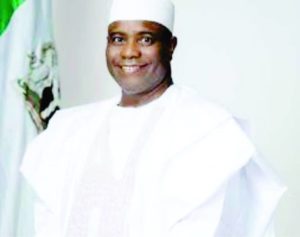
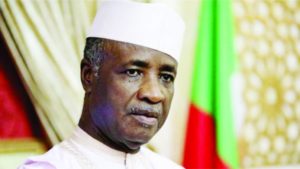
Both Aliyu Wamakko, a former governor of Sokoto State and his predecessor, Aminu Tambuwal, were strong political allies who had a robust working relationship until the tune changed.
Their relationship was that good forcing Wamakko to say this of his then godson in the build up to the 2015 elections: “as a patriot who is religiously committed to the even socio-economic development of the state. He said at the time that the choice of Tambuwal as the party’s gubernatorial candidate in the state was not a misplaced priority, adding that the people will not regret it.
But soon after Tambuwal succeeded his godfather as governor, the drumbeats of their friendship changed as Wamakko became increasingly uncomfortable with most actions of his godson.
The feud between godfather and godson reportedly led to the sacking of appointees loyal to Wamakko by Tambuwal following a cabinet shakeup.
Shortly after a rally allegedly sponsored by the state government was held against Wamakko, a top government official in the state reportedly said: “ It’s time for the governor to draw a line between him and Wamakko. The SEC had to go because 50 percent of commissioners were foisted on Tambuwal. Those who want to remain with Tambuwal can conveniently pledge their loyalty and those for Wamakko should follow him. The two leaders are certainly no longer on the same page,” he concluded.
In the run up to the last general elections in the state, rallies and counter rallies were held in Sokoto with both men flexing their political muscles and testing their popularity with the people.
In a bid to be his own man and exert some personal influence, Tambuwal, in a move that shocked political pundits, returned to the Peoples Democratic Party with 18 state lawmakers while Wamakko was left with 12. All these were in preparation over who controls the state in the run up to the 2019 general elections.
In dumping the APC, Tambuwal had this to say: “The party has brazenly turned itself into a sanctuary for the corrupt and a machine for rigging and the rape of democracy. Let me also put it on record that all attempts to discuss the electoral promises of the APC-led government, including the restructuring of the country as promised Nigerians and as contained in the APC manifesto, have proved abortive.”
On his part, Wamakko said in one of his party’s rallies: “The present political situation in Sokoto is not between me and Governor Tambuwal but between APC as a political party and the dead PDP
With the former allies drawing swords, the stage was set for a pulsating governorship contest in 2019 even as the people of the state were left in quandary over where or who to pitch their tent with.
In the ensuing confusion, 252 appointees of Tambuwal resigned their positions as they refused to follow their principal to APC. He equally lost a chunk of his supporters towards the end of last year, while his Commissioner for Information and Chairman of the Publicity Committee, of his Gubernatorial Campaign Council, Bello Muhammad Goronyo, to the APC. These defections raised doubts over the ability of Tambuwal to win re-election.
The permutations and predictions were in favour of the APC Wamakko backed candidate, Mr Ahmad Aliyu who was Commissioner of Health under the administration of Mr Wamakko and hails from Sokoto metropolis.
But all said, Tambuwal survived the tough challenge of Ahmed Aliyu and his godfather by polling 512,002 votes, while his APC opponent got 511,661. He triumphed by a measly 341 votes. That victory was recently affirmed by the Supreme Court.
Ortom versus Akume
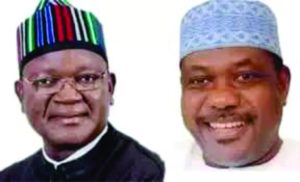
Samuel Ortom and George Akume’s political romance began when the latter foisted the former on the APC as the party’s governorship candidate.
From there on, their relationship grew as Ortom, backed by his godfather, triumphed at the polls thereby dislodging PDP from power.
But their once burgeoning relationship started experiencing cracks when Ortom, sensing that his godfather was preparing another person to take over the reins of power in 2019, reshuffled his cabinet and flushed out appointees loyal to Akume.
Just a little over two days after sacking Akume’s men, Governor Samuel Ortom did away with Mrs. Mimi Adzape-Orubibi of her position as Executive Chairman of Benue Internal Revenue Service (BIRS) and his Urban Development counterpart, Richard Agwa both of whom were close associates of Sen. George Akume.
In a move that further widened the crack in their relationship, the Speaker of the Benue State House of Assembly, Terkimbi Ikyange, said to be loyal to Akume, was impeached. This development left Akume with eight loyal lawmakers and Ortom with 22.
In an attempt to get back at Ortom, the eight lawmakers loyal to Akume, in collaboration with the impeached Speaker served impeachment notice on Ortom. But the move hit a brick wall after a Markudi High Court presided over by Justice Theresa Igoche issued an interim order restraining the eight lawmakers from going ahead with their impeachment process against the governor.
With the relationship of godfather and godson having fallen on hard times, both men looked forward to the 2019 elections as a perfect stage to settle their bitter political scores. In preparation for the tough contest, Ortom rejoined the PDP.
But having won the hearts of the people of Edo across party lines with his tough stance against the killer herdsmen, Ortom won re-election having polled a total of 434,473 votes to beat Mr Emmanuel Jime of the APC who scored 345,155 votes.
Oshiomhole versus Obaseki
Theirs was like a relationship that would last forever until events unleashed spanners in the works.
Mr Godwin Obaseki was the head of Comrade Adams Oshiomhole’s Economic team during the latter’s tenure as governor. Given the mastery with which he managed the economy and his unalloyed loyalty to his godfather, Oshiomhole had no second thought in supporting Obaseki to succeed him as Edo State governor.
During the campaigns for the 2016 gubernatorial election in the state, Oshiomhole was at the centre of it all as he, at every local government area visited, spoke glowingly of his godson. His support for Obaseki was vigorous and unwavering.
Eventually, Obaseki defeated his main rival and candidate of the PDP, Osagie Ize-Iyamu, with 319,483 who had 253, 173 votes to emerge governor principally riding on the coattails of his benefactor, Adams Oshiomhole.
But cracks in their relationship reared its head in the build up to the primaries for members of the state House and National Assembly. Those supported by Oshiomhole contrasted sharply with those of his successor, Obaseki. Since they could not find a common ground of addressing their choice of candidates, the cracks widened.
In the early days of his administration, Obaseki was said to have alienated top party men from his government. Most of them went to Oshiomhole to lay their complaints since he was the one that brought Obaseki. The former NLC boss reportedly made efforts to intervene, but didn’t really make a headway.
Another issue that further tore the hitherto good relationship between Oshiomhole and Obaseki apart was the inauguration of the Edo State 7th Assembly. After a long wait, Godwin Obaseki issued a proclamation letter to the clerk of the Assembly, Alhaji Audu Yahaya Omogba who subsequently inaugurated 10 out of the 24 members-elect.
This left Oshiomhole fuming given that those who were absent from the inauguration were his loyalists. He made subtle and sustained moves to reverse what had been done all to no avail.
Since then, both men have been exchanging heated words in the media with Oshiomhole having quoted to have said recently that the political situation in the state is likened to that of a buzzing mosquito around the ear. “The test of the leadership is when a mosquito is blowing your ear, if you keep quiet, nobody will hear and if you shout mosquito, mosquito, everybody will hear. May we not be provoked by it.”
But in a quick retort, Obaseki said: “mosquito is capable of causing malaria. According to him, “they say we are mosquito, but we will show them mosquito can cause malaria. If you are not careful, malaria will kill you.”
The next election in the state holds later this year. But with the fractured relationship between godfather and protégé, a tough race to the Edo State government house is certainly in the offing.
Given the gang-up against him, rumours are rife that Obaseki may defect to PDP to realise his second term ambition more so given the defection of Osagie Ize-Iyamu to the APC. A move said to have been engineered by Oshiomhole as he perfects strategies to oust Obaseki from power.
While Obaseki has severally denied plans of quitting the APC, claiming no one can intimidate him out of the party, some party top shots insist he has concluded plans of joining the PDP.
Should he remain in the APC, Obaseki will be up against about six aspirants who have indicated interest to vie for the party’s ticket. This in addition to the hurdles posed by a wounded Oshiomhole and his allies.
Will Obaseki, a man who came from the private sector, overcome the many booby traps ahead and win re-election without the backing of his estranged godfather? The answer lies in the womb of time.
RELATED: The Tale Of How Godfathers And Godsons Turn Foes (1)

